The ironies of history
Tintin banned by British race police
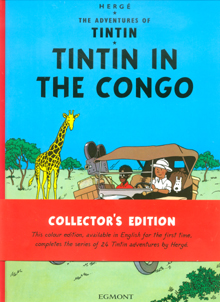
Tintin in the Congo - the Commission for Racial
Equality has demanded the book's withdrawal
The Adventures of Tintin is one of the most popular comic book stories ever. Its author Hergé, the pen name of the Belgian artist Georges Remi, published the first story in 1929 and left the last unfinished at his death in 1983.
First appearing as serials, the cartoons were collected into 23 books, which have been published in more than fifty languages and sold more than 200 million copies worldwide.
The most recent British edition of the Tintin books originally omitted one title - the second in the series - Tintin in the Congo, first published in 1931 and later in amended versions in 1946 and 1975. This was deemed to be too controversial for a modern readership because of some unflattering portrayals of Africans.
In 2006 a new British edition of Tintin in the Congo was finally published, but sure enough the Commission for Racial Equality has now acted to protect the nation's youth. In July 2007 the CRE demanded that the nationwide chain Borders should remove the book from its stores, insisting:
This book contains imagery and words of hideous racial prejudice, where the 'savage natives' look like monkeys and talk like imbeciles.
How and why do Borders think that it's okay to peddle such racist material?
Yes, it was written a long time ago, but this certainly does not make it acceptable. This is potentially highly offensive to a great number of people.
It beggars belief that in this day and age Borders would think it acceptable to sell and display Tintin in the Congo.
To its credit Borders refused to remove the book completely, but shifted it from the children's to the adult section. A Borders spokesman offered what, in the circumstances, was a rare and brave defence of freedom:
Naturally, some of the thousands of books and music selections we carry could be considered controversial or objectionable depending on individual political views, tastes and interests.
However, Borders stands by its commitment to let customers make the choice. After consideration of this title, we have instructed all stores to move it to the adult graphic novels section.
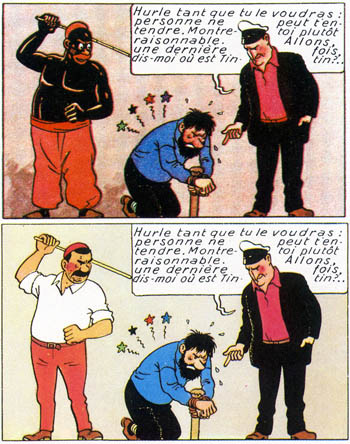
When is racism not racism?
An American edition of Tintin replaced a black character with a
vaguely Arab looking villain. I wonder why?
There are two further extraordinary aspects to this tale. Even while the CRE and Borders were disputing whether Tintin's 'racism' made him unsuitable for a 21st century audience, discussions continued in Hollywood for a blockbuster film of the young detective's adventures, to be made by the heavyweight duo of Steven Spielberg and Peter Jackson.
More extraordinary still - given Spielberg's record of venomous hostility to certain aspects of Europe's history - is the true story of Léon Degrelle, Hergé's original inspiration for the Tintin character.
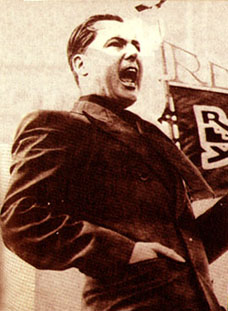
The young orator and journalist
Léon Degrelle - on whom Tintin was based
Degrelle was a crusading journalist and politician in pre-war Belgium, where he became a friend of Hergé, who based his Tintin drawings on Degrelle.
In 1935 Degrelle founded the Rexist Party, which campaigned against corruption in Belgian politics and for a revival of traditional Catholicism.
After the initial German advances into Belgium and France in 1939-40, and the later outbreak of war with Stalin's Soviet Union, Degrelle founded what became the Wallonien Division of the Waffen SS, recruiting anti-communists to fight on the Eastern Front.
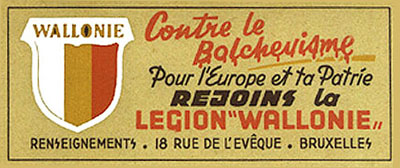
A recruiting poster for the Wallonien SS
Early in 1944 Degrelle was severely wounded while leading his division's breakout from the Cherkassy salient in the Ukraine, which had been surrounded by the Red Army. He insisted on returning to the frontline, and was engaged again in the fierce battles which marked the German retreat to Berlin during 1944-45.
For his part in the Cherkassy campaign, Degrelle was awarded the Ritterkreuz by Adolf Hitler - he later became one of the few non-Germans to hold the Ritterkreuz mit Eichenlaub, and ended the war with the rank of General.
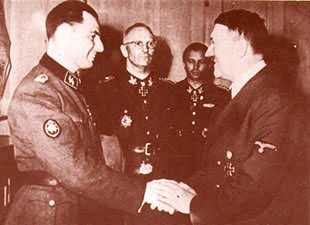
Léon Degrelle with Adolf Hitler
Condemned to death in absentia by the new Belgian government which the victorious Allies installed, Degrelle escaped by plane to Spain, where he lived until his death at the age of 87 in 1994, devoting most of his time to political and historical writing, including some of the earliest revisionist scholarship and campaigning.
Degrelle recalls the circumstances of his dramatic escape in this article - Alea jacta est.
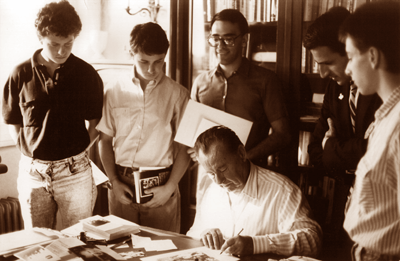
Gen. Degrelle with members of the Spanish
student organisation CEDADE